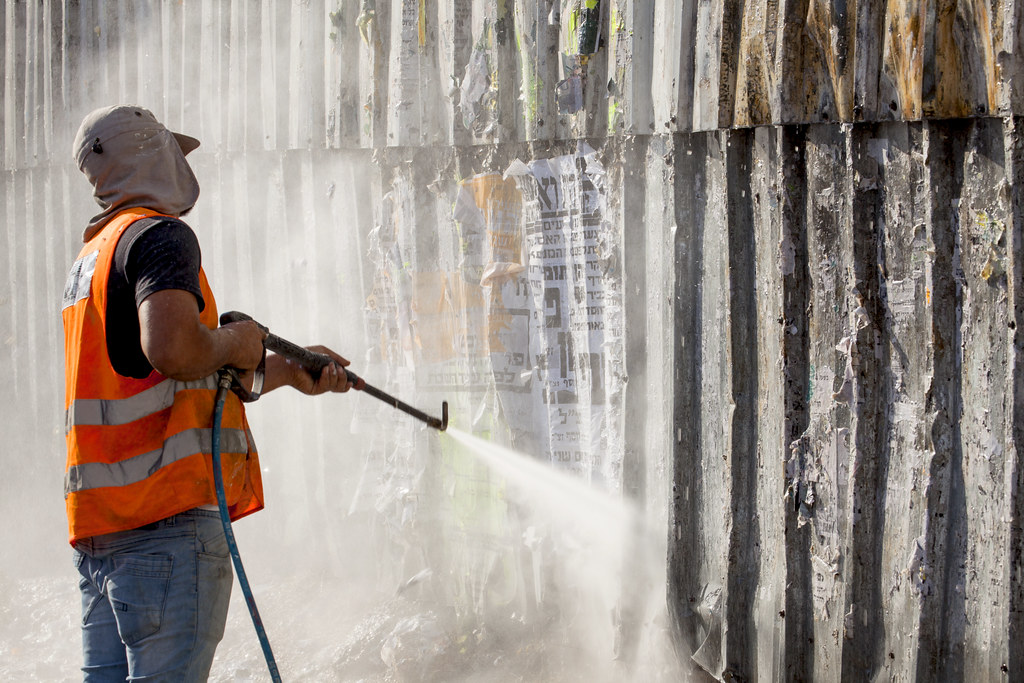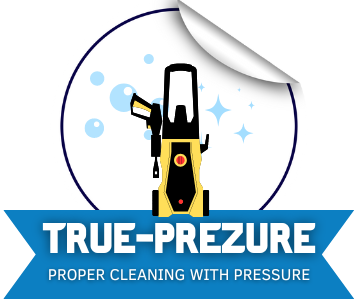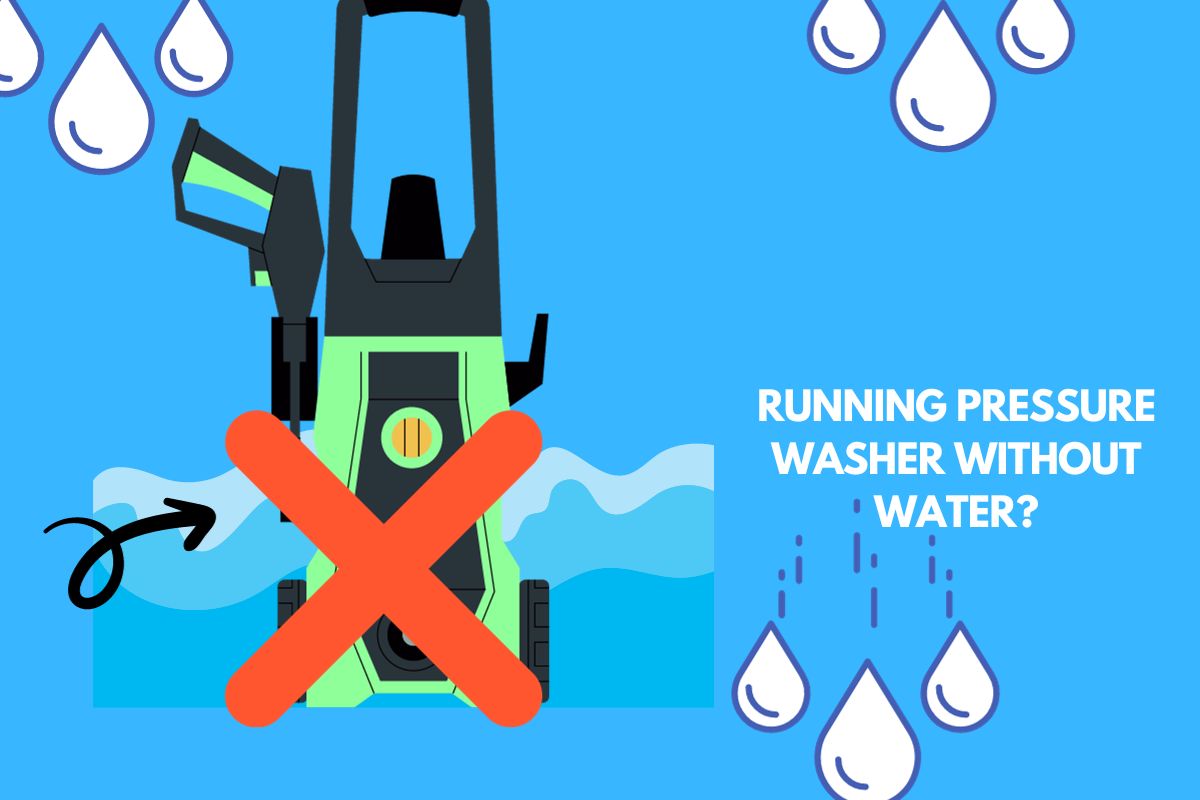Pressure washers are an essential tool for cleaning the exterior of your home, car, or any outdoor surface.
However, have you ever wondered if it’s possible to start a pressure washer without water? Well, in this blog post, we will discuss whether running a pressure washer without water is safe or not.
We’ll also take a closer look at how pressure washers work and provide you with some tips on how to diagnose and take care of your machine. So before pressing the power button on your pressure washer again, keep reading!
Can You Start A Pressure Washer Without Water?
A pressure washer is designed to take water from a source, such as a garden hose, and pump it through the machine at high pressure. Without water flowing through the system, there’s nothing for the pump to push out. Therefore, attempting to start your pressure washer without water can cause significant damage.
When you turn on the power button of your pressure washer before connecting it with a steady flow of water, air bubbles will enter into the pump head causing cavitation. This damages impellers and seals which are responsible for generating sufficient force for cleaning surfaces.
If you’re lucky enough that no damage occurred after starting your machine without water then congratulations! But keep in mind that doing this repeatedly may lead to permanent damage over time.
So always ensure that there is an adequate supply of water available before turning on your pressure washer. It’s also essential to flush out any remaining air pockets by squeezing the trigger handle on your gun with running water until all air has been expelled from inside the hose.
The Basics: How does a pressure washer work?
A pressure washer is a powerful cleaning tool that uses high-pressure water to remove dirt and grime from surfaces. It works by utilizing a motor to power a pump, which then creates a high-pressure stream of water through an attached wand or nozzle.
The motor powers the pump, which pulls water from its source and increases its pressure through mechanical means. This pressurized water is then directed out of the wand at incredibly high speeds, allowing it to cut through tough stains and debris with ease.
Different types of nozzles can be attached to the end of the wand to adjust both the angle and force of the spray. For example, some nozzles emit a wide fan-shaped spray pattern for covering larger areas quickly while others produce more concentrated streams for tougher jobs like removing paint.
Understanding how your pressure washer works is essential in maintaining it properly and getting optimal results when using it for cleaning tasks.

Diagnosing your pressure washer for damage after powering it without water
If you’ve accidentally powered your pressure washer without water, it’s important to diagnose it for any damage before using it again. Here are some ways to check for potential issues:
Firstly, inspect the pump and its components. If there’s any visible damage or leaks, that could indicate a problem caused by running the machine without water.
Next, test the trigger gun and nozzle. If they’re not working properly or if there’s low pressure coming out of them, that could also be a sign of damage.
Check the engine oil as well – if it appears milky or contaminated with water, this is an indication that water may have gotten into the pump.
Inspecting hoses and connections is also essential after powering your pressure washer without water. Any cracks or breaks in these parts can cause leaks which will decrease performance.
It’s important to keep in mind that even if no visible damage is detected after running your pressure washer without water , internal damages may still occur over time due to overheating . Always remember to only power on your pressure washer when connected with a reliable source of clean water!
Can pressure washers work with little water?
One common question that pressure washer owners have is whether their machine can work with little water. The answer to this question isn’t straightforward since it depends on several factors.
Firstly, the type of pressure washer you own will determine how much water it needs to operate effectively. For instance, gas-powered models usually need higher gallons per minute (GPM) compared to electric ones.
Secondly, the type of cleaning task at hand also influences how much water your machine requires. Cleaning a small patio set may require less water than washing a large commercial building.
Using too little water can cause damage to your pressure washer’s pump and motor by creating excessive heat buildup and making them overwork.
While some pressure washers may be able to function with less water in certain circumstances, it’s always best to follow manufacturer recommendations for optimal performance and avoid causing any potential harm or damage.
Taking care of your pressure washer: Important precautions and tips
Proper maintenance is crucial in ensuring that your pressure washer operates effectively and efficiently for a long time. Here are some vital tips to keep your machine in great condition.
Firstly, always read the manufacturer’s guidelines before using and maintaining the equipment. This will help you understand which cleaning agents or detergents can be used with your machine, how much water it needs to run smoothly, and other important information.
Secondly, make sure that you have enough space to operate the pressure washer comfortably without any obstructions. Always place it on a level surface, away from heat sources or wet areas.
When cleaning up after use, ensure that all detachable parts are removed and rinsed thoroughly with clean water. Store them safely in a dry place until next use.
Remember to check for leaks regularly by inspecting hoses and seals around pump connections. If there are any visible signs of wear or tear on these parts, replace them immediately as they could cause serious damage if left unattended.
By following these simple precautions and tips when handling your pressure washer unit you can prolong its lifespan while ensuring optimal performance every time you need to put it into action!
Why Shouldn’t You Run A Pressure Washer Without Water?
Running a pressure washer without water is one of the worst things you can do to it. It’s like driving a car with no oil or gas – sure, it may start, but you’ll be causing some serious damage in the process.
First and foremost, running your pressure washer without water will cause the pump to overheat. The water acts as coolant for the pump, so when there’s no water flowing through it, there’s nothing to cool down the moving parts. This heat buildup can warp your seals and cause them to leak or even burst.
In addition to damaging the pump itself, running a pressure washer without water can also lead to other issues downstream in your system. For example, if you have an unloader valve that isn’t receiving enough backpressure due to lack of water flow, this could cause it to malfunction or even break altogether.
So why take these risks? Always remember that prevention is better than cure! Make sure your hoses are connected properly and double-check that they’re turned on before starting up your machine. If you’re unsure about anything related to using your pressure washer safely and correctly then consult with an expert first!
What Should You Do After Running Pressure Washer Without Water
After running your pressure washer without water, it is important to take immediate action to prevent any potential damage. The first thing you should do is turn off the machine and unplug it from the power source. This will help avoid any electrical hazards that can be caused by a malfunctioning or overheating machine.
Next, disconnect the hose from both ends of the pressure washer and remove any debris that may have accumulated inside. Check for visible signs of damage such as cracks or leaks in the hoses, pump or wand.
It’s also recommended to inspect all other components of your pressure washer, including nozzles and fittings. Replace any damaged parts before using your pressure washer again.
In addition, flush out any remaining water from the system by turning on the machine with just water flowing through it for about 30 seconds. Doing this will help remove any air pockets in the hoses and pump which could potentially cause further damage when starting up again.
Refill your reservoir with clean water before turning on your pressure washer again. By following these simple steps after running a pressure washer without water you can ensure its longevity while preventing future damages.
conclusion
Running a pressure washer without water can cause serious damage to the pump and other components of the machine. It’s essential to ensure that your pressure washer is adequately supplied with water before starting it up.
Remember, prevention is always better than cure when it comes to taking care of your pressure washer. Always follow the manufacturer’s instructions, use clean and adequate amounts of water, and avoid overusing your machine beyond its capacity.
By following these precautions and tips for maintaining your pressure washer, you’ll be able to extend its lifespan while ensuring optimal performance every time you need it. With proper care and attention, you can enjoy using your pressure washer for years without any issues related to running it without water.
Faq-
How long can a pressure washer run without spraying water?
Pressure washers are incredibly efficient machines that can help you tackle heavy-duty cleaning tasks. However, it’s important to understand how long a pressure washer can run without spraying water before starting any project.
The answer depends on several factors, such as the make and model of your pressure washer and the type of fuel it uses. Generally speaking, gas-powered pressure washers are designed to run continuously for hours without needing a break. On the other hand, electric-powered models may need periodic rests to prevent overheating.
Another crucial factor is the pressure washer’s pump – running it without water will cause damage to the machine in mere seconds. The pump relies on water flow to cool down and lubricate its internal components while running. Without this essential liquid flowing through it, your pump will overheat quickly and fail.
Never operate your pressure washer without any source of water because doing so will harm its functioning parts beyond repair almost immediately. Be sure always to have an adequate supply of water ready before operating your machine – better safe than sorry!
How do you pressure wash without a water source?
If you’re looking to pressure wash without a water source, there are a few options available. One solution is to use a portable water tank that can be filled up and transported to the area you need to clean. Another option is using a pressure washer with an integrated water supply tank.
Another possibility is using a bucket of water and manually refilling it as needed during cleaning. This method may not be ideal for large jobs but can work well for smaller areas or spot-cleaning.
It’s important to note that when using alternative methods for providing water, you’ll want to make sure your pressure washer’s pump is compatible with the type of liquid being used. For example, some pumps may not function properly with hot or dirty water.
While it’s possible to pressure wash without access to a traditional water source, it may require some additional planning and equipment.
Will a pressure washer run a well dry?
If you’re using a pressure washer with water from a well, it’s important to make sure that your well is capable of keeping up with the demand. If your well runs dry while you’re using the pressure washer, it can cause damage to both your pump and your pressure washer.
Before starting any work, check the capacity of your well by measuring its depth and consulting with an expert. Depending on how deep the water is in your well, you may need additional equipment or modifications to keep up with heavy use.
It’s also important to be conscious of how much water you’re using while operating a pressure washer. Start by testing different spray patterns at varying distances until you find one that provides adequate cleaning power without wasting too much water.
If you plan on regularly using a pressure washer with well water, it’s worth investing in proper equipment and taking steps to ensure that there will always be enough water available for your needs.
Can you use a pressure washer with just air?
In summary, it’s not recommended to start a pressure washer without water as it can damage the machine. The pump needs water to lubricate and cool down the system components. Without water, the seals may wear out quickly, leading to costly repairs or replacements.
If you need to use a pressure washer without access to a water source, there are some alternatives like using a bucket of water or connecting it directly to your home’s plumbing system. However, always make sure that there is enough flow and pressure for your specific model.
Some people might wonder if they can use their pressure washers with just air instead of water. The answer is no; this will not work since most machines rely on pressurized water for cleaning power.
By keeping these tips in mind and taking care of your pressure washer properly, you can enjoy powerful cleaning performance for many years!

